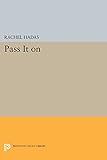Pass It On / Rachel Hadas.
Material type: TextSeries: Princeton Series of Contemporary Poets ; 76Publisher: Princeton, NJ : Princeton University Press, [2014]Copyright date: ©1989Edition: Course BookDescription: 1 online resource (86 p.)Content type:
TextSeries: Princeton Series of Contemporary Poets ; 76Publisher: Princeton, NJ : Princeton University Press, [2014]Copyright date: ©1989Edition: Course BookDescription: 1 online resource (86 p.)Content type: - 9780691607061
- 9781400859900
- 811.54
- PS3558.A3116
- online - DeGruyter
- Issued also in print.
| Item type | Current library | Call number | URL | Status | Notes | Barcode | |
|---|---|---|---|---|---|---|---|
 eBook
eBook
|
Biblioteca "Angelicum" Pont. Univ. S.Tommaso d'Aquino Nuvola online | online - DeGruyter (Browse shelf(Opens below)) | Online access | Not for loan (Accesso limitato) | Accesso per gli utenti autorizzati / Access for authorized users | (dgr)9781400859900 |
Frontmatter -- Contents -- Acknowledgments -- I -- The Fields of Sleep (Summer -- Earth and Air (Fall) -- Fix It (Winter) -- Hortus Conclusus (Spring -- Over the Edge -- II -- Pass It On) I -- Pass It On, II -- The Blind Gates -- Teaching Emily Dickinson -- The Lost Filling -- Mortalities -- Pass It On) III -- Teaching the Iliad -- Philoctetes -- Pass It On, W -- Teacher between Terms -- Generations -- III -- Summer in White, Green, and Black -- First Hight Back -- Odds Against -- The Writing on the Wall -- The Burial of Jonathan Brown 1983-1985 -- Three Silences -- Four Angers -- Five Botched Goodbyes -- The End of Summer -- Nourishment
restricted access online access with authorization star
http://purl.org/coar/access_right/c_16ec
The poems in Rachel Hadas's new book are united by a common preoccupation with passage--passage variously construed. In Section I, the four seasons are glimpsed in turn through the lenses of several types of personal associations, especially parenthood. As spring gives way to fall and winter, separation looms; diverse kinds of temporary and permanent renewal come with spring, and the fifth poem in this section steps outside this cycle. In Section II, the phrase "pass it on" recalls the game "telephone," in which a word is whispered by one speaker to another. Here the poems focus on tradition, primarily as it is transmitted through teaching, but also through art and again parenthood. Thoughts on teaching specific texts (the Iliad, Dickinson's poems, Sophocles' Philoctetes) alternate with more personal moments of contemplation. Finally, in Section III "pass it on" comes to signify transition--whether between spring and summer, city and country, youth and age, presence and absence, or life and death.From "Three Silences": Of all the times when not to speak is best, mother's and infant's is the easiest, the milky mouth still warm against her breast.Before a single year has passed, he's well along the way: language has cast its spell. Each thing he sees now has a tale to tell.A wide expanse of water-cean. Look! Next time, it seems that water is a brook. The world's loose leaves, bound up into a book.Originally published in 1989.The Princeton Legacy Library uses the latest print-on-demand technology to again make available previously out-of-print books from the distinguished backlist of Princeton University Press. These editions preserve the original texts of these important books while presenting them in durable paperback and hardcover editions. The goal of the Princeton Legacy Library is to vastly increase access to the rich scholarly heritage found in the thousands of books published by Princeton University Press since its founding in 1905.
Issued also in print.
Mode of access: Internet via World Wide Web.
In English.
Description based on online resource; title from PDF title page (publisher's Web site, viewed 30. Aug 2021)


